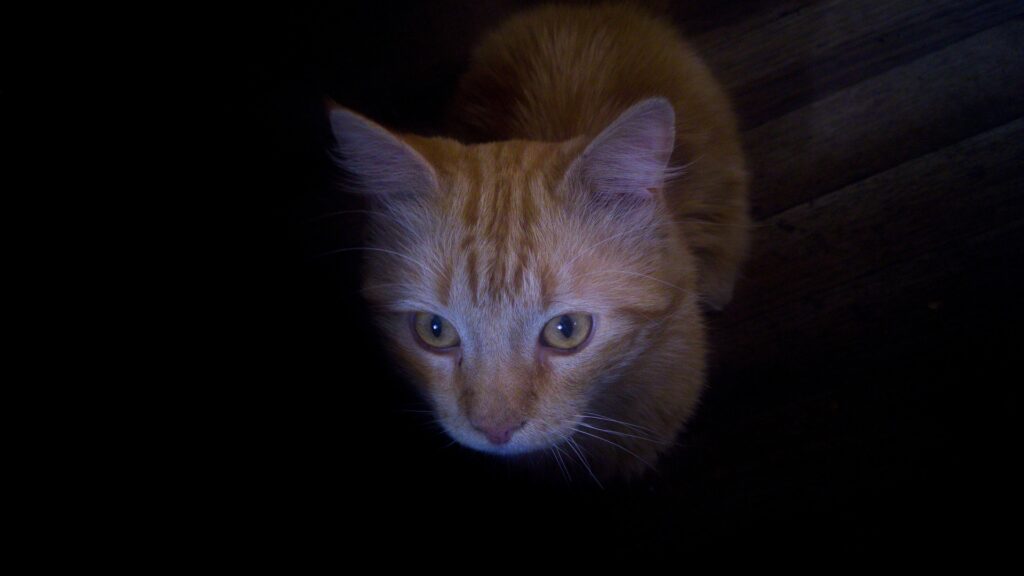Everyone knows what it’s like to be scared of the dark. It’s a feeling that can paralyze even the bravest of us, and it’s one that many animals feel too. But do baby cats experience fear when left in the dark? In this article, we will explore this question in detail. We will discuss scientific evidence around the behavior of young kittens, as well as their natural instincts and behaviors when exposed to darkness. We will also discuss some tips on how to help your baby cat feel safe and secure even in the dark. Read on to learn more!
Are cats scared of the dark?
Generally, cats are not scared of the dark. But depending upon the nature and personality, some cats may be afraid and others will not. Cats have night vision that is far better than humans. Cats can see in even low levels of light.
Kittens can be scared of the dark if it is associated with any bad past experience like being hunted, abused, or captured. If your baby cat is injured in dark or got any psychological trauma in dark, it will leave her in fear. So observe your cat whether she is afraid of the dark or not. If she is afraid of the dark, then follow the directions as mentioned in this article below.
Signs of a cat that is scared of the dark
There are several signs that a cat is scared of the dark. Firstly, they may avoid going into rooms or areas that are not well-lit. Secondly, they may startle easily when something unexpected happens in the dark. Thirdly, they may meow or cry more than usual when it is dark. Finally, they may hide under furniture or in closets when it starts to get dark outside. If you notice any of these behaviors in your cat, it is likely that they are scared of the dark. A few other noticed signs are listed:
- Dilated pupils are a sign of afraid cats.
- A scared cat shows increased heart rate (Normal heart rate is 120-140)
- A scared cat has wet prints of paws. Like humans, they sweat more during stress or when scared. Their sweat glands in paw pads explain the wet prints they leave behind.
- Your cat can face changes in feeding habits.
- Your baby cat can show aggressive behavior as well.
Can my cat see in the dark?
Cats have a natural ability to see in low levels of light. This is the physiology of the visual system of the cat that makes it happen. It is the retina of the eye that makes them see in partial darkness.
The retina is a layer in the eye socket that is involved in visualization. The retina comprises two types of photoreceptors (Rods & Cones). These photoreceptors convert visual information into electrical signals that are translated by the brain. Rods are the receptors that work in darkness while cones are responsible for day vision. Cats have 8 times more rod cells than humans. More rods mean better night vision. Cats need about 1/6th of the light amount to see as compared with humans. A dark for humans is actually not dark for cats.

Can I leave my cat in dark?
Yes, cats are not scared of the dark unless they have faced a past negative experience in dark. Cats need a low level of light to see. In fact, they prefer partial darkness! Cats are naturally crepuscular or partly nocturnal creatures, so they feel most comfortable when it’s dark outside. Sometimes, too dark can also scare cats because they need some light to see.
Cats can have some physiological or pathological issues with the eyes that result in poor night vision. Cats with negative past experiences and the above issue should have a night light on them.
What to do when my cat is scared of the dark
When your cat is scared of the dark, there are a few things you can do to help them feel more comfortable. First, try to keep the lights on in your home at night so that they can see where they are going. You can also try placing a night light in their room or in the hallways so that they have some light to guide them around. If your cat is still having trouble adjusting to the dark, you can try giving them a toy that glows in the dark or buying a special set of cat eyeglasses that will help them see better in the dark. If your scared kitten is not getting settled with time and still growing as a scared adult cat, then consult with a Veterinarian.


